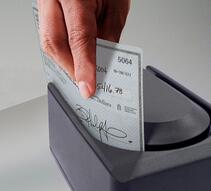
Merchant Check Verification
If you are accepting checks as part of your business, you better be using some type of merchant check verification. Why? One of the reasons that many people like to pay with checks is because it offers what is known as a “float.” Check writers can write a check, even though they don’t have the money in the bank, and then try to get money in the bank within two or three days. Even if the check doesn’t clear, the customer is long gone with the merchandise by the time a retailer finds out that the check is bad. Technology, though, is reducing the pitfalls associated with checks. This technology is called merchant check verification. It operates similarly to the advanced technology on which the Fully-Verified platform is based, which specializes in verifying of all types of transactions and documents involved.
What is Merchant Check Verification
Electronic check readers now make it possible to verify checks before you accept them. Merchant check verification is a process by which you can get a better idea of whether or not the customer is known for bouncing checks, or if there is a chance of having the check returned. If there are red flags on that customer’s check, you will be notified, and you can deny the transaction.
How Merchant Check Verification works
Merchant check verification works by using relatively new technology and by using a connection to the banking system to verify transactions. When a customer pays with check, it is sent through an electronic check reader. This reader can “read” the numbers on the bottom of the check that indicate routing number and account number. This information is then sent over your communications lines, much as credit card information is sent to banks for approval information.
The processing system designed for check verification runs the record against the other check transactions from that same customer, and uses the information to let you know whether or not there is a red flag. The whole process takes only a couple of seconds. If the check comes back likely to clear, then you can feel reasonably sure that the check will not bounce. The records are available for more than 76 million checking accounts, all over the country, so it can be helpful even when processing out of state checks.
What Information Does a Merchant Check Verification System Provide
When using a merchant check verification system you can get a lot of information regarding the check. The most obvious information is that the check is good. However, in the those rare occasions the merchant check verification system can tell you the following:
- The account is close.
- The check has a stop payment on it.
- The check is over the limit.
- The account has uncollected funds.
- The account is not valid.
- The account is a non DDA account.
- The account isn’t supposed to have checks issued.
- The account doesn’t have any debits.
- The account is NSF or has non sufficient funds.
What Happens If The Check Bounces
If the check does bounce after being cleared by the system, it is automatically sent to collections. You don’t need to go through extra steps of trying to collect on the debt. You are not charged any fees for this service. Once the collection is made, you are paid 100% of the check amount; nothing is deducted from the total amount you collected. You are out the money while the check goes through collections, but there is an incentive for the customer to pay, since if they do not, their account is red-flagged, and the next check written and checked through the verification process will be denied, no matter what merchant is used.
Check Verification Services
While there aren’t usually fees associated with per-transaction verification, or with collections, there are monthly fees often charged to use a check verification system. Plus you will have to buy or rent an electronic check reader. Some merchants refuse to take checks altogether, eliminating the problem by avoiding checks. However, if you still accept checks, and you are concerned about a high amount of bounced checks, merchant check verification may be a good solution for you.
Be sure to carefully consider your options, and compare different companies. If you are happy with your current credit card processor, you can ask if the company also offers check verification. Many of them do. Once you have decided on a course of action, you can limit your losses by knowing when to reject a check that is likely to bounce.
National Card Payments
- No Set Up Fees
- No Minimum Monthly Fees
- Better pricing than Costco, PayPal, and Square!
Durango Merchant Services
- Fast Approval
- Bad Credit or High Risk Account Options
- Rates starting at 2%
eMerchantBroker
- 24 Hour Approval
- Domestic and Offshore High Risk Accounts
- ACH, MOTO, Online Sales, POS…